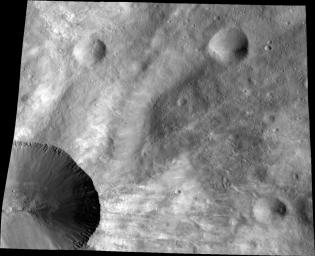
|
Canuleia, Up Close
- Click the image above for a larger view
- Full-Res JPEG (1470 x 1196) (212.3 kB)
- Full-Res TIFF (1470 x 1196) (1.8 MB)
Caption:
This image from NASA's Dawn spacecraft shows a close up of part of the rim around the crater Canuleia on the giant asteroid Vesta. Canuleia, about 6 miles (10 kilometers) in diameter, is the large crater at the bottom-left of this image. This close-up image illustrates the structure of the interior of the crater and complex details of the fresh rays across the soil of Vesta.
The image was taken by Dawn's framing camera on Dec. 29, 2011, from an altitude of about 130 miles (210 kilometers).
Background Info:
The Dawn mission to the asteroids Vesta and Ceres is managed by NASA's Jet Propulsion Laboratory, a division of the California Institute of Technology in Pasadena, for NASA's Science Mission Directorate, Washington. Dawn is a project of the directorate's Discovery Program, managed by NASA's Marshall Space Flight Center in Huntsville, Ala. UCLA is responsible for overall Dawn mission science. The Dawn Framing Cameras have been developed and built under the leadership of the Max Planck Institute for Solar System Research, Katlenburg-Lindau, Germany, with significant contributions by DLR German Aerospace Center, Institute of Planetary Research, Berlin, and in coordination with the Institute of Computer and Communication Network Engineering, Braunschweig. The framing camera project is funded by the Max Planck Society, DLR, and NASA/JPL-Caltech.
More information about the Dawn mission is online at http://www.nasa.gov/dawn and http://dawn.jpl.nasa.gov .
Cataloging Keywords:
| Name | Value | Additional Values |
|---|---|---|
| Target | 4 Vesta | |
| System | Main Belt | |
| Target Type | Asteroid | |
| Mission | Dawn | |
| Instrument Host | Dawn | |
| Host Type | Orbiter | |
| Instrument | Framing Camera (FC) | |
| Detector | ||
| Extra Keywords | Crater, Grayscale | |
| Acquisition Date | ||
| Release Date | 2012-10-31 | |
| Date in Caption | 2011-12-29 | |
| Image Credit | NASA/JPL-Caltech/UCLA/MPS/DLR/PSI/Brown | |
| Source | photojournal.jpl.nasa.gov/catalog/PIA16176 | |
| Identifier | PIA16176 | |
